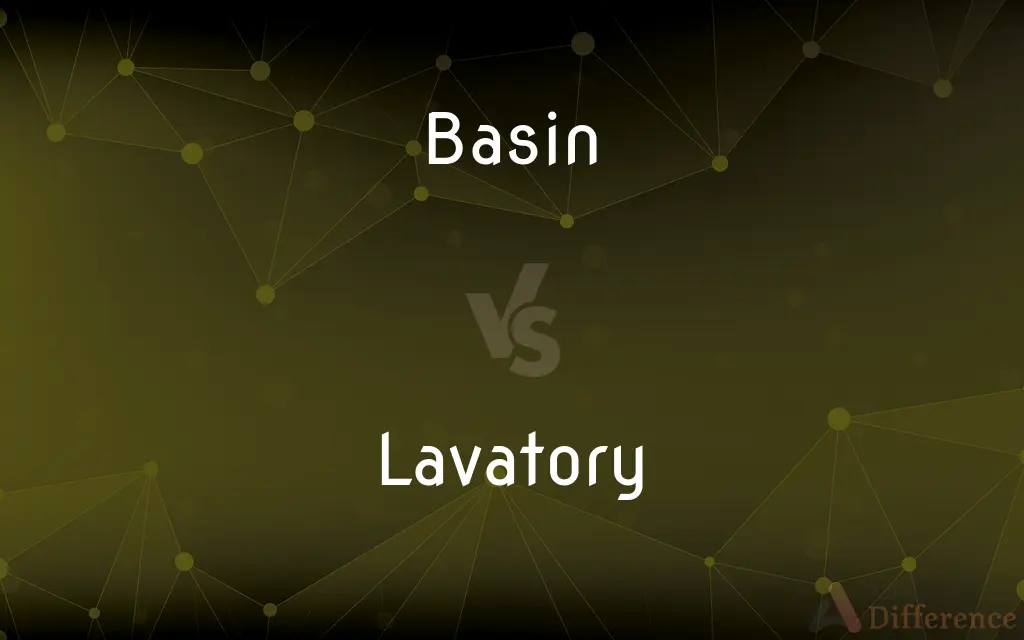Basin vs. Lavatory — What's the Difference?
By Tayyaba Rehman & Urooj Arif — Updated on April 4, 2024
A basin is primarily a bowl for holding water, often used for washing, whereas a lavatory is a room or fixture for washing, typically including a toilet.

Difference Between Basin and Lavatory
Table of Contents
ADVERTISEMENT
Key Differences
A basin is a receptacle designed to hold water for washing hands, dishes, and other small items. It can be portable or fixed and is often found in bathrooms and kitchens. On the other hand, a lavatory refers to a room equipped with washing facilities and often includes a toilet. The term can also specifically refer to the fixture itself, commonly known as a sink in American English.
Basins are typically shallower than lavatories, designed for quick hand washes or holding water for cleaning purposes. Whereas lavatories, especially when referring to the room, are designed for more comprehensive personal hygiene routines, including using the toilet, washing hands, and sometimes bathing.
In terms of usage, basins are primarily focused on the task of holding water for washing, without the direct implication of waste disposal. Lavatories, however, are inherently linked to sanitation and the disposal of human waste, offering facilities for both washing and toileting.
Material-wise, basins can be made from a variety of materials, including ceramic, metal, or plastic, depending on their intended use and placement. Lavatories, particularly the fixtures within, are usually made from materials like porcelain or stainless steel, emphasizing durability and ease of cleaning.
Culturally and historically, the basin has been a staple in many civilizations for basic hygiene practices, symbolizing purity and cleanliness. The lavatory, with its more complex plumbing and sanitation systems, represents advancements in public health and hygiene, reflecting a society's commitment to cleanliness and disease prevention.
ADVERTISEMENT
Comparison Chart
Definition
A bowl for holding water, often used for washing hands and small items.
A room or fixture for washing, including toilets.
Primary Use
Washing hands, dishes, etc.
Personal hygiene, including using the toilet and washing hands.
Location
Commonly found in bathrooms and kitchens.
Found as a separate room or as a fixture within bathrooms.
Material
Ceramic, metal, plastic.
Porcelain, stainless steel for fixtures; varied for rooms.
Historical Role
Symbol of cleanliness in many cultures.
Represents advancements in sanitation and public health.
Compare with Definitions
Basin
Primarily used in personal grooming and kitchen tasks.
She filled the basin with water to wash the fresh fruits.
Lavatory
A room or fixture for washing, often including a toilet.
The airplane's lavatory was surprisingly spacious.
Basin
Can be made from a variety of materials, including ceramic and metal.
The stainless steel basin in the kitchen is highly durable.
Lavatory
Usually a separate room or a designated area within a bathroom.
The hotel suite featured a luxurious lavatory with modern amenities.
Basin
Historically a symbol of cleanliness and purity.
In ancient times, the basin was a crucial part of daily cleanliness rituals.
Lavatory
Reflects advancements in public health and sanitation.
Modern lavatories symbolize the importance placed on hygiene and health.
Basin
A container for holding water, especially for washing.
The ceramic basin was filled with warm soapy water for cleaning.
Lavatory
Designed for comprehensive hygiene routines, including toileting.
He went to the lavatory to freshen up before the meeting.
Basin
Often found as a fixed installation in bathrooms and kitchens.
The bathroom basin is installed next to the mirror for easy access.
Lavatory
Fixtures are typically made from porcelain or stainless steel.
The lavatory fixtures were chosen for their sleek design and durability.
Basin
A bowl for washing, typically attached to a wall and having taps connected to a water supply; a washbasin.
Lavatory
A room, building, or cubicle containing a toilet or toilets
He locked himself in the downstairs lavatory
Public lavatories
Basin
A wide open container used for preparing food or for holding liquid
She poured water from the jug into the basin
Lavatory
A room equipped with washing and often toilet facilities; a bathroom.
Basin
A circular or oval valley or natural depression on the earth's surface, especially one containing water
The loch is cupped in a shallow basin among low hills
Lavatory
A washbowl or basin, especially one permanently installed with running water.
Basin
An open, shallow, usually round container used especially for holding liquids.
Lavatory
A flush toilet.
Basin
The amount that such a vessel can hold.
Lavatory
A vessel or fixture for washing, particularly:
Basin
A washbowl; a sink.
Lavatory
A laver: a washbasin.
Basin
A body of water that is connected to the sea and is partially or almost completely enclosed by land.
Lavatory
(archaic) A bathtub.
Basin
A small body of water that is artificially enclosed.
Lavatory
(Christianity) A piscina: the basin used for washing communion vessels.
Basin
See watershed.
Lavatory
(Christianity) A lavabo: the basin used for washing one's hands before handling the Eucharist.
Basin
A broad tract of land in which the rock strata are tilted toward a common center.
Lavatory
A baptismal font: the basin used for baptism, used figuratively for the washing away of sins.
Basin
A large, bowl-shaped depression in the surface of the land or ocean floor.
Lavatory
(construction, interior design) A plumbing fixture used for washing: a sink.
Their 'bathroom' included a toilet and a lavatory but no bath.
Basin
A wide bowl for washing, sometimes affixed to a wall.
Lavatory
Handwashing as an act, particularly
Basin
(obsolete) A shallow bowl used for a single serving of a drink or liquidy food.
Lavatory
(Christianity) The lavabo: the ritual washing of hands before handling the eucharist.
Basin
A depression, natural or artificial, containing water.
Lavatory
(Christianity) The ritual washing of hands after using the piscina to clean the communion vessels.
Basin
(geography) An area of land from which water drains into a common outlet; drainage basin.
Lavatory
(obsolete) A liquid used in washing; a lotion; a wash; a rinse.
Basin
(geography) A shallow depression in a rock formation, such as an area of down-folded rock that has accumulated a thick layer of sediments, or an area scooped out by water erosion.
Lavatory
(dated) A washroom: a room used for washing the face and hands.
Basin
To create a concavity or depression in.
Lavatory
(euphemism) A room containing a toilet: a bathroom US or WC UK.
Americans don't know 'WC' and Brits mock 'bathroom' but everyone usually understands 'toilet' or 'lavatory'.
Basin
To serve as or become a basin.
Lavatory
A plumbing fixture for urination and defecation: a toilet.
Basin
To shelter or enclose in a basin.
Lavatory
(dated) A place to wash clothes: a laundry.
Basin
A hollow vessel or dish, to hold water for washing, and for various other uses.
Lavatory
(obsolete) A place where gold is panned.
Basin
The quantity contained in a basin.
Lavatory
(obsolete) A paved room in a mortuary where corpses are kept under a shower of disinfecting fluid.
Basin
A hollow vessel, of various forms and materials, used in the arts or manufactures, as that used by glass grinders for forming concave glasses, by hatters for molding a hat into shape, etc.
Lavatory
(dated) Washing, or cleansing by washing.
Basin
A hollow place containing water, as a pond, a dock for ships, a little bay.
Lavatory
Washing, or cleansing by washing.
Basin
A circular or oval valley, or depression of the surface of the ground, the lowest part of which is generally occupied by a lake, or traversed by a river.
Lavatory
A place for washing.
Basin
An isolated or circumscribed formation, particularly where the strata dip inward, on all sides, toward a center; - especially applied to the coal formations, called coal basins or coal fields.
Lavatory
A basin or other vessel for washing in.
Basin
A bowl-shaped vessel; usually used for holding food or liquids;
She mixed the dough in a large basin
Lavatory
A wash or lotion for a diseased part.
Basin
The quantity that a basin will hold;
A basinful of water
Lavatory
A place where gold is obtained by washing.
Basin
A natural depression in the surface of the land often with a lake at the bottom of it;
The basin of the Great Salt Lake
Lavatory
A room containing one or more sinks for washing, as well as one or more toilet fixtures; also called bathroom, toilet, and sometimes commode. Commode and toilet may refer to a room with only a toilet fixture, but without a sink.
Basin
The entire geographical area drained by a river and its tributaries;
Flood control in the Missouri basin
Lavatory
A room equipped with toilet facilities
Basin
A bathroom or lavatory sink that is permanently installed and connected to a water supply and drainpipe; where you wash your hands and face;
He ran some water in the basin and splashed it on his face
Lavatory
A bathroom or lavatory sink that is permanently installed and connected to a water supply and drainpipe; where you wash your hands and face;
He ran some water in the basin and splashed it on his face
Lavatory
A toilet that is cleaned of waste by the flow of water through it
Common Curiosities
What is the main difference between a basin and a lavatory?
A basin is specifically designed to hold water for washing, while a lavatory refers to a room or fixture for comprehensive hygiene, including toilets.
Are basins found outside of bathrooms?
Yes, basins can also be found in kitchens and laundry rooms for washing purposes.
Is a lavatory the same as a bathroom?
Yes, in many contexts, lavatory can refer to a bathroom, especially in terms of public or commercial facilities.
Are all lavatories equipped with toilets?
While most lavatories include toilets, the term can also refer to any room or fixture dedicated to washing and hygiene.
What materials are basins commonly made of?
Basins are commonly made from ceramic, metal, or plastic.
Can the terms basin and lavatory be used interchangeably?
Not exactly, as a basin specifically refers to the vessel for holding water, whereas a lavatory encompasses a broader range of hygiene facilities.
What is a pedestal basin?
A pedestal basin is a free-standing sink supported by a pedestal base, commonly found in bathrooms.
Can a basin be portable?
Yes, basins can be portable, especially those used for camping or temporary setups.
How do the functions of basins and lavatories reflect societal values?
The functions and designs of basins and lavatories reflect societal values on hygiene, convenience, and public health.
How has the design of lavatories evolved over time?
Lavatory designs have evolved to include more efficient water usage, improved sanitation, and aesthetic enhancements.
What is the significance of a basin in cultural practices?
Basins have historically symbolized cleanliness and purity in many cultural rituals.
What features might a modern lavatory include?
Modern lavatories might include automatic faucets, touchless soap dispensers, and energy-efficient lighting.
What advancements in lavatory design are focused on sustainability?
Advancements include low-flow toilets, water-saving faucets, and the use of recycled materials for fixtures.
Why is porcelain a popular material for lavatory fixtures?
Porcelain is durable, easy to clean, and aesthetically pleasing, making it a popular choice for lavatory fixtures.
How do cleaning requirements differ between basins and lavatories?
Basins require regular cleaning to prevent buildup from soap and water, while lavatories need more comprehensive sanitation due to the presence of toilets.
Share Your Discovery

Previous Comparison
Rabbit vs. Cow
Next Comparison
Publicise vs. PublishAuthor Spotlight
Written by
Tayyaba RehmanTayyaba Rehman is a distinguished writer, currently serving as a primary contributor to askdifference.com. As a researcher in semantics and etymology, Tayyaba's passion for the complexity of languages and their distinctions has found a perfect home on the platform. Tayyaba delves into the intricacies of language, distinguishing between commonly confused words and phrases, thereby providing clarity for readers worldwide.
Co-written by
Urooj ArifUrooj is a skilled content writer at Ask Difference, known for her exceptional ability to simplify complex topics into engaging and informative content. With a passion for research and a flair for clear, concise writing, she consistently delivers articles that resonate with our diverse audience.
















































